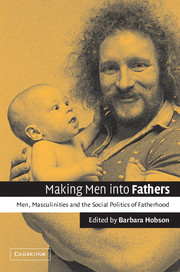Book contents
- Frontmatter
- Contents
- List of figures
- List of tables
- Preface
- Introduction: making men into fathers
- Part 1 Who fathers?
- Part 2 Men in social policy and the logics of cash and care
- Part 3 Resisting and reclaiming fatherhood
- Part 4 Theorizing men, masculinities and fatherhood
- 9 Men, fathers and the state: national and global relations
- 10 Epilogue
- Notes
- References
- Index
9 - Men, fathers and the state: national and global relations
Published online by Cambridge University Press: 22 September 2009
- Frontmatter
- Contents
- List of figures
- List of tables
- Preface
- Introduction: making men into fathers
- Part 1 Who fathers?
- Part 2 Men in social policy and the logics of cash and care
- Part 3 Resisting and reclaiming fatherhood
- Part 4 Theorizing men, masculinities and fatherhood
- 9 Men, fathers and the state: national and global relations
- 10 Epilogue
- Notes
- References
- Index
Summary
Debates about fathers and fatherhood need to be more explicitly gendered and more explicitly about power. Fathers need to be understood as gendered and as men, and fatherhood needs to be understood as an institution, historically constructed as a form of certain men's power. Fathers and fatherhood are social, rather than “natural” or biological, constructions and institutions (O'Brien 1981; Hearn 1987), intimately connected with the social production and reproduction of men, masculinities and men's practices. In particular, the relationship of fathers, “the family” and the state is a matter of the relationship of men, gendered families and the gendered state.
This chapter addresses this basic problematic, and as such builds on recent work within Critical Studies on Men. This has emphasized the importance of questions of men's societal and structural dominations within patriarchies; the pluralizing of masculinity to masculinities set within relations of power, and the analysis of the interrelations of unities and differences between men; and men's specific practices, identities, sexualities and subjectivities. In particular this analysis of fathers, fatherhood, families and the state follows earlier work on the changing historical relations of men/fathers to the state and the welfare state within public patriarchies; the complexity of men's power and the extent of men's (often fathers') violences to women; and the interrelations of social oppressions and institutions.
These genderings are partly about changing forms of identity, organization, welfare, state, nation and global relations – particularly in the transitions from what might be called modern to late modern social relations.
- Type
- Chapter
- Information
- Making Men into FathersMen, Masculinities and the Social Politics of Fatherhood, pp. 245 - 272Publisher: Cambridge University PressPrint publication year: 2002
- 17
- Cited by

